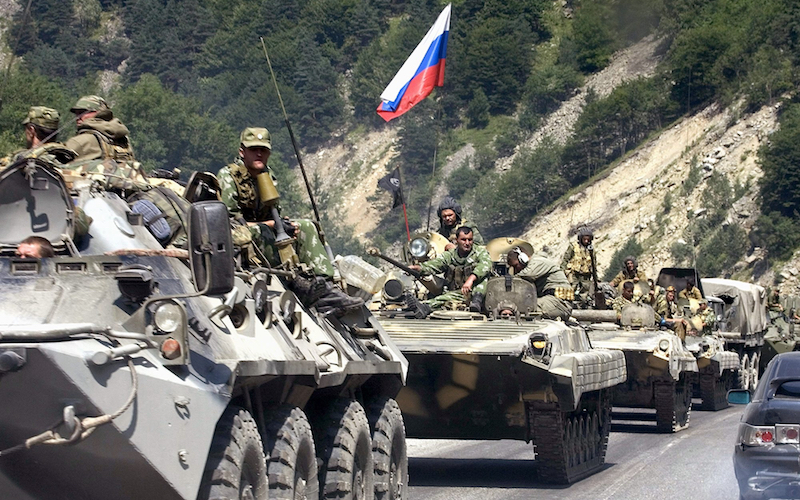
Russia has the Most to Lose in Syria
When Russia notified the US of their intention to intervene in Syria on Sep. 30, 2015, they did so in typical Kremlin fashion: a Russian general was sent to the US Embassy in Iraq. After warning American aircraft in northern Syria to vacate the airspace, Russian airstrikes began one hour later. Two years into the intervention, Bashar al-Assad’s regime is back on its feet, having regained much of the territory it had lost.
Yet the war continues. Local powers such as Turkey, Saudi Arabia and the Gulf States have all poured money and resources into seeing that Assad is removed, for their own various reasons. The US and its allies have intensified efforts to destroy ISIS, while also letting it do as much damage to the Assad regime as possible. The number of elements opposed to Assad is so diverse that it’s almost admirable. The only reason he is still alive is that Russia has reason to save him.
Bases: The Russian naval facility in Tartus is the country’s only permanent naval base in the Mediterranean. It allows Russia to repair and refuel some of its ships, while also existing as a hub of Russian power far beyond its borders. In January of this year, the Syrian and Russian governments extended the lease of the base for another 49 years, as well as allowing Russia to expand its capabilities there. Also signed was a 49-year lease for a permanent Russian airbase in Syria, giving Moscow the capability to quickly bomb anyone in the Middle East.
If the Russians are forced to retreat from Syria, then they will probably lose both of their military bases there. International prestige is heavily based on a country’s potential to inflict damage on other countries. Russia will seem a lot less intimidating in the Middle East, should these bases be abandoned.
Natural Gas: In 2009, Assad rejected a proposal from Qatar to build a natural gas pipeline that would cross through Syria. His reasoning was based on the fact that it would harm his dear ally Russia, Europe’s current top supplier of natural gas. Moscow frequently uses its natural resources as leverage over European countries, especially those in Eastern Europe, who are far more dependent on Russian natural gas. If Assad falls or submits to the will of the Qataris, a separate pipeline supplying Europe would seriously threaten Russia’s ability to blackmail the countries that need its gas.
Considering the amount of money Qatar has thrown at various rebel groups, it seems Doha is pretty intent on having Assad removed. Imagine European countries as a bunch of drug addicts. Russia is their current dealer, but Qatar wants to pass through Syria’s backyard and sell to them directly as well. Like drug gangs, resource-rich countries often do whatever it takes to make sure their supply lines are stable and unrivaled. Retreating from Syria would make that far more difficult for Moscow.
Geopolitical Posturing: Before Russia intervened in the Syrian civil war, Russian forces were busy invading Crimea. The operation provided Putin with a significant boost in domestic popularity, but it also demonstrated that Russian allies were defecting, and the Kremlin was on the defensive (despite attacking the sovereign nation of Ukraine). The Syrian intervention helped alleviate those concerns. Furthermore, it shows other countries in Russia’s immediate orbit that Moscow is prepared to act militarily, in order to secure Russian interests and allies.
Russia’s move in Syria took American pressure off the Ukrainian front. Sure, sanctions against Russia remain in place, but American resources have been redirected. The Russian intervention has complicated the American-led intervention in Syria, which began in September 2014. If Russian forces can’t help keep Syria under their control, the struggle over Ukraine will come back to the forefront of American-Russian affairs.
Russia needs a resolution in the Syrian civil war. Putin has a lot of resources, but he is vastly outmatched by the collective power of the US and everyone else fighting Assad. Nonetheless, the Russians have so much invested in the conflict that it is currently do-or-die scenario. They are unlikely to remove themselves from Syria unless they feel it’s absolutely necessary. Whatever a post-war Syria comes to resemble, Russia wants to keep its military bases, prevent any pipelines from being built, and have a trustworthy leader in place who guarantees all of this. The conditions are antithetical to every other regional power in the Middle East, but they lack the same resources that Russia and the US can deploy.
Therefore, the only way the Syrian civil war is ending is if Russia and the US can agree on the terms of peace. Considering how badly Russia needs a victory, the ball is in America’s court.

